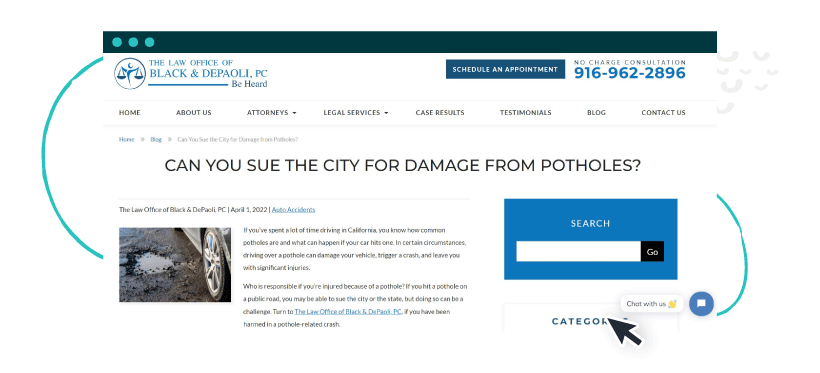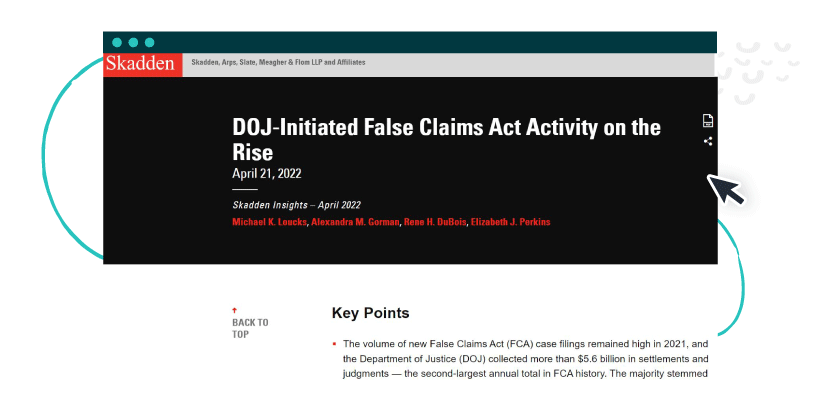Countless potential clients search for legal blog content daily.
Maintaining a professional legal website is more than just having a few service pages along with your contact info. It’s also about providing additional information that your prospective clients will find valuable.
That’s why some of the biggest firms use legal blog content to attract prospects and engage existing clients.
Read on to find out the benefits of having a blog for your law firm and some of the best legal blog content ideas to get started.

Why do law firms have blogs?
Whether it’s to attract prospective clients or establish your firm as experts in your niche – there are many reasons why your law firm needs a blog.
1. Improved ranking in search engine results
Search engine optimization (SEO) is crucial for driving traffic to your law firm’s website, and the blog is an essential part of every SEO strategy.
In fact, high-quality content is a top-ranking factor in Google search results. One case study even revealed that blogging helped to increase organic traffic by a whopping 372% within a five-month period.
By sharing high-quality, keyword-optimized legal blog content on a regular basis, your website can rank more prominently in search engine results and improve your visibility to attract relevant traffic.
Moreover, publishing high-quality content on trending legal topics is an excellent way to get link-backs from the best legal blogs, which further boosts your domain authority in the eyes of search engines.
2. Demonstrating their legal expertise through content
Lawyers need to build authority in their field to win the trust of prospective clients. When searching for legal representation, people naturally want to work with someone they can trust to help them navigate complex legal situations.
When you regularly share your legal expertise through blog content, prospective clients and peers can see that you know what you’re talking about.
This is a great way to demonstrate your legal expertise and build a name for your firm in the legal space.
3. Providing value to prospective clients
As the world increasingly moves to the digital space, people use the internet to find the information they need in almost every aspect of their lives. This includes information related to legal questions.
For example, a property owner may want to look up the legal implications of renting out their home, or a parent may need more information about laws surrounding custody.
The right law blog topics can answer those questions and provide value to the people asking them – people who may turn into prospective clients.
So when those prospects are ready to get legal help, they may turn to you since they’re already familiar with your law firm and have an established relationship with you through your legal blog content.
4. Alternative to traditional marketing
Considering the nature of your practice, there are many times when traditional marketing tactics may not work for your target audience. TV advertising and print advertising may be unable to deliver the kind of results you need.
Content marketing through interesting legal stories and informative legal guides can prove to be a powerful alternative.
The best legal blogs use indirect marketing to establish trust with their prospective clients by sharing content that adds value to their lives. They may answer common legal questions, provide helpful guides on how to navigate specific situations, and share important law updates.
This helps them to build their reputation and form a strong relationship with their prospects, which they can’t always achieve using traditional marketing tactics.
5. Saving time for both parties
Your law firm blog can serve as a useful channel to answer frequently asked questions in the legal space or specific to your niche. For example, you may publish a guide on which types of lawyers to consult for specific situations or what processes landlords have to follow when drawing up a rental agreement.
Making the legal blog content easily accessible saves time for prospects since they don’t have to call you up or visit your office just to get answers to basic legal questions.
Similarly, this not only enables you to deliver better service but also saves you the trouble of sending emails back and forth or having a lengthy discussion with your prospects.
What should lawyers blog about?
While you may be all ready to start blogging, the first step can get a little challenging. This involves deciding on the best law blog topics to cover. What should lawyers blog about in the first place?
Asking the following key questions can help you develop great legal blog content ideas:
- What are the currently trending legal topics?
- Are there any recent legal stories you can cover?
- What are the best legal blogs of 2023 covering?
Based on these questions, you should be able to get a fair idea of what you should write about. Additionally, here are a few legal content ideas that you can use for your blog.
Answer frequently asked questions with legal blog content
While having an FAQ section on your site is great, perhaps some topics need more in-depth explanations than a two-sentence answer. Turn those topics into in-depth blog posts that will answer the question in detail, explaining all the tiny nuances.
For example, you could have a blog post answering the question of whether citizens can sue the city for damage from potholes.
Credit: Black & Depaoli
Discuss the latest industry news
Use your blog to keep on top of the latest news in your industry. This could include new trends or statistics related to your area of expertise or your practice. You could also share updates and commentary on trending legal stories to inform and engage your audience.
For example, a corporate law firm may want to cover news about the increase in False Claims Act case filings in a bid to encourage prospects to be more vigilant with their audit and compliance programs.
Credit: Skadden
Share important law changes
Have there been any amendments to laws affecting your clients and prospects? Sharing informative legal blog content about these law updates is a great way to continue providing value to your audience. It also allows you to keep your blog content fresh for Google to prioritize.
For example, you could cover a new state-specific bill that could expand damages in wrongful death cases.
Credit: Eason & Tambornini
Provide niche-specific tips/guides
Demonstrate your knowledge by sharing detailed tips and guides through your blog. This gives you evergreen content for your website while helping prospects understand the process a bit better.
For example, a family law firm may share some tips on resolving high-conflict custody battles.
Credit: Clark & Schloss
Start developing your legal blog content
With all these benefits and ideas at your disposal, you only have to start writing content to develop your legal blog. However, between handling active cases and managing your firm-client relationships, you may not have the time to write.
Also, you may not know how to write legal blog content in the first place.
If you need help with any part of the process, consider working with professional legal writers who can create high-quality content on law-related topics. Talk to a content specialist today to learn more.








